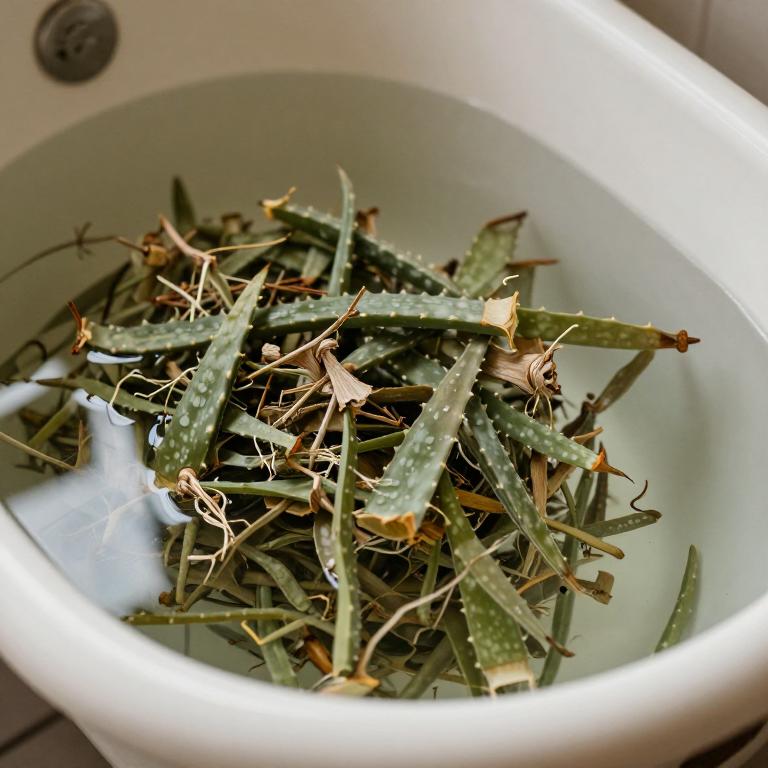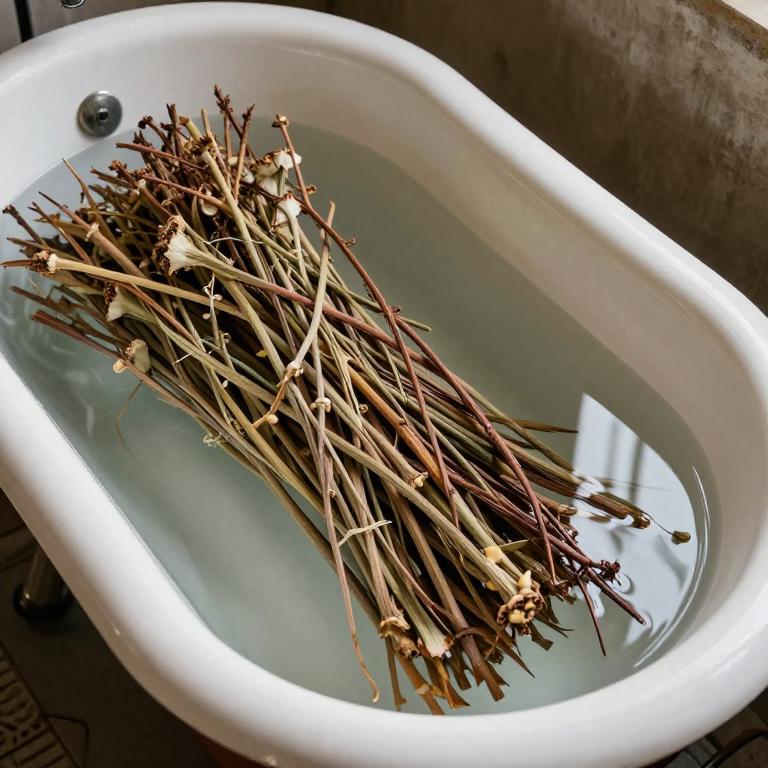10 Best Herbal Baths For Oily Skin

Herbal baths can be a beneficial addition to a skincare routine for individuals with oily skin, as they help to cleanse and balance the skin's natural oils.
Certain herbs such as chamomile, lavender, and green tea are known for their soothing and anti-inflammatory properties, which can reduce excess sebum production and calm skin irritations. These herbs also possess mild antiseptic qualities that can help prevent breakouts and maintain a clearer complexion. To use them effectively, simply add a few drops of herbal essential oils or a handful of dried herbs to warm bath water and soak for 15 to 20 minutes.
Regular herbal baths can promote relaxation and enhance overall skin health, making them a natural and soothing alternative to harsh chemical-based cleansers.
Table of Contents
- 1. Salvia (Salvia officinalis)
- 2. St. john's wort (Hypericum perforatum)
- 3. Field horsetail (Equisetum arvense)
- 4. Rosemary (Rosmarinus officinalis)
- 5. Stinging nettle (Urtica dioica)
- 6. German chamomile (Chamomilla recutita)
- 7. Aloe vera (Aloe barbadensis)
- 8. Lemon grass (Cymbopogon citratus)
- 9. English lavender (Lavandula angustifolia)
- 10. Ginger (Zingiber officinale)
1. Salvia (Salvia officinalis)

Salvia officinalis, commonly known as sage, is a versatile herb that can be beneficial for individuals with oily skin when used in herbal baths.
Sage contains natural compounds such as rosmarinic acid and flavonoids, which have antimicrobial and anti-inflammatory properties that help regulate sebum production and reduce excess oiliness. Incorporating sage into a bath involves steeping dried sage leaves in hot water and then using the infused water to bathe the skin, allowing the skin to absorb its soothing and purifying properties. This natural remedy can help balance skin oils, minimize the appearance of acne, and promote a clearer complexion.
Regular use of sage-infused baths can contribute to healthier, more balanced skin without the use of harsh chemicals.
2. St. john's wort (Hypericum perforatum)

Hypericum perforatum, commonly known as St. John's Wort, is often used in herbal baths for its potential benefits for oily skin.
When infused into bath water, it can help reduce excess sebum production and soothe inflammation associated with oily skin types. The anti-inflammatory and antimicrobial properties of hypericum may help prevent breakouts and maintain a balanced skin microbiome. Additionally, its mild astringent effects can help tighten pores and improve skin texture.
However, it is important to use it cautiously, as some individuals may experience skin irritation or allergic reactions.
3. Field horsetail (Equisetum arvense)

Equisetum arvense, commonly known as scouring rush, has been traditionally used in herbal baths for its astringent and detoxifying properties, making it particularly beneficial for oily skin.
When infused into water, it helps to cleanse the skin by removing excess sebum and impurities, promoting a clearer complexion. The plant contains silica and other minerals that can help balance skin pH and reduce the appearance of pores. Regular use of equisetum arvense baths may also help regulate oil production and prevent breakouts.
However, it is important to dilute the infusion properly to avoid skin irritation, and consulting with a herbalist or dermatologist is recommended for optimal results.
4. Rosemary (Rosmarinus officinalis)

Rosmarinus officinalis, commonly known as rosemary, is a powerful herb often used in herbal baths for its refreshing and therapeutic properties.
When infused into bath water, rosemary helps to cleanse the skin by stimulating circulation and regulating sebum production, making it particularly beneficial for those with oily skin. Its natural antiseptic and anti-inflammatory compounds can help reduce excess oiliness and prevent breakouts. The aromatic properties of rosemary also provide a calming and uplifting effect, enhancing the overall bathing experience.
Regular use of rosemary-infused baths can help maintain a balanced skin environment, promoting clearer and healthier skin over time.
5. Stinging nettle (Urtica dioica)

Urtica dioica, commonly known as stinging nettle, is a versatile herbal remedy that can be used in baths to benefit oily skin.
When infused into water, stinging nettle helps to cleanse the skin by removing excess oils and impurities, making it particularly effective for those with oily or acne-prone skin. The plant contains natural astringents and anti-inflammatory compounds that can help reduce skin irritation and redness. Regular use of stinging nettle baths can also promote a balanced skin pH and improve overall skin texture.
However, it is important to ensure the herb is properly prepared and diluted to avoid any potential skin irritation.
6. German chamomile (Chamomilla recutita)

Chamomilla recutita, commonly known as chamomile, is a popular herb used in herbal baths for its calming and skin-soothing properties.
When used in bath water, chamomile helps to reduce inflammation and redness, making it particularly beneficial for those with oily skin. Its natural anti-inflammatory and antioxidant compounds can help balance sebum production and prevent breakouts. The gentle, soothing aroma of chamomile also promotes relaxation and can improve the overall skin texture.
Regular use of chamomile herbal baths can provide a natural, gentle alternative to commercial skincare products for maintaining healthy, balanced oily skin.
7. Aloe vera (Aloe barbadensis)

Aloe barbadensis, commonly known as aloe vera, is a versatile herbal remedy that can be beneficial for those with oily skin when used in bath form.
Aloe vera contains natural enzymes, vitamins, and minerals that help to soothe and balance the skin's natural oils. When incorporated into a herbal bath, it can help to gently exfoliate and cleanse the skin without stripping it of its essential moisture. The anti-inflammatory properties of aloe can also reduce redness and irritation commonly associated with oily skin types.
Regular use of aloe barbadensis in baths may lead to a more balanced, clearer complexion and improved overall skin health.
8. Lemon grass (Cymbopogon citratus)

Cymbopogon citratus, commonly known as lemon grass, is a natural herb that has been used for centuries in traditional medicine for its therapeutic properties.
When used in herbal baths, lemon grass can help cleanse and purify the skin, making it particularly beneficial for individuals with oily skin. The essential oils in lemon grass possess antibacterial and astringent properties that can help regulate sebum production and reduce excess oiliness. A warm bath infused with lemon grass can also soothe inflammation and calm skin irritations associated with oily skin types.
Regular use of lemon grass baths may contribute to a clearer, more balanced complexion by promoting healthy skin renewal and detoxification.
9. English lavender (Lavandula angustifolia)

Lavandula angustifolia, commonly known as English lavender, is a popular herb used in herbal baths for its soothing and therapeutic properties.
When infused into bathwater, lavender essential oil or dried lavender flowers can help balance oily skin by regulating sebum production and reducing excess oiliness. The calming aroma of lavender also promotes relaxation and can alleviate stress, which is a common trigger for breakouts. Its anti-inflammatory and antimicrobial properties make it effective in soothing irritated skin and preventing acne.
Incorporating lavender into a regular bathing routine can provide a natural, gentle alternative to harsh chemical treatments for those with oily skin concerns.
10. Ginger (Zingiber officinale)

Zingiber officinale, commonly known as ginger, has been traditionally used in herbal baths to benefit oily skin due to its anti-inflammatory and antimicrobial properties.
When added to bath water, ginger helps to gently exfoliate the skin, removing excess oil and dead skin cells without causing irritation. Its warming effect can also improve blood circulation, promoting a healthier skin tone and reducing the appearance of blemishes. For oily skin, ginger baths can help regulate sebum production and prevent clogged pores, making them a natural and soothing alternative to commercial cleansers.
Regular use of ginger-infused baths can lead to a more balanced, refreshed complexion while offering a relaxing and aromatic self-care experience.